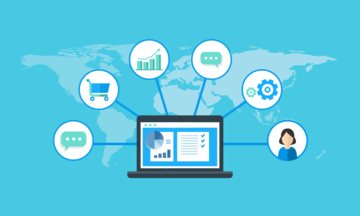CRM (Customer Relationship Management) is an effective tool that can help your company boost productivity, streamline sales, and grow profits. Today, we will tell you what CRM can do for your business, who needs it, and how to choose the best software for your needs.
What is CRM?
CRM systems collect information about how your departments interact with your clients and prospects. They keep the information in one place, making it easily available to different departments.
Such systems go beyond storing customers’ names, addresses, phone numbers, and emails. They record details of every purchase, call, chat or support inquiry, and then some. In short, CRM creates a complete customer profile, giving insight to your buyers’ preferences, interests, and habits.
Having this information, your business can build a stronger connection with the clients through personalized experience and address their needs faster.
CRM systems can organize data by various parameters (customer, product, etc.) and generate reports based on that data. Reports are stored centrally and are available to your sales, marketing, and management. They can be analyzed to boost productivity, increase profits, and develop an effective business strategy, and grow sales.
How CRM Helps Marketing
Your marketing department can use records of sales team communication with clients to determine frequent concerns and common questions. It can then generate solutions to better address these.
CRM can tell you how your customers find you. You can use this information to highlight the marketing investment with the best return.
Integrating CRM with email enables your marketers to create more effective email campaigns with relevant content to better move prospects through the funnel.
How CRM Helps Sales
With CRM in place, every member of your sales team can access customer records quickly and track the progress of every deal.
Sales reps can contact customers at the right time to make more sales by relying on automated reminders.
Cloud-based solutions make your sales force mobile by giving access to relevant customer information even outside the office, minimizing lost sales opportunities.
A streamlined sale process with a clear action plan in place speeds up new employee training. The rookie only has to learn the basics of the system to perform as efficiently as the rest of the team.
How CRM Helps Customer Support
By having access to full customer interaction records, a customer support representative can provide highly personalized service to each client. They can give faster response times, leading to a higher level of customer satisfaction.
How CRM Helps Business Leaders
CRM generated reports provide valuable insights into different stages of your business processes. Standardized tracking and report systems provide coherent uniform data, easy to interpret and analyze. Managers can use this data to:
- Identify effective sales methods and ineffective strategies
- Identify profitable products and markets
- Monitor individual department goals
- Track individual performance of sales team members
- Evaluate marketing campaign ROI
- Make more accurate sales predictions
- Set more accurate profit goals
- Provide better coaching
Who Needs CRM?
Data management choices that work for small businesses rarely fit with growing companies. A growing enterprise faces the risk of valuable customer information becoming unmanageable because it is stored in different formats. CRM consolidates vital client information into one system and creates order.
Virtually any growing company can benefit from a CRM solution. Here is a list of who needs a CRM system the most:
B2B Businesses. Many CRM systems can store contacts (individuals) under specific accounts (companies). These solutions work even if you do some B2C.
Businesses with numerous leads. If you struggle to keep track of all your clients and leads, you need CRM. Use it to store client history and create reminders for follow-up. If you call your prospect a year from now, you will still have all the information you need.
Businesses with a wide product range. Some companies need to manage information by product type, which CRM can do as well.
Businesses with long sales processes. If your sales process is long, tracking each prospect and their stage in the sales cycle becomes a challenge. CRM keeps all communication between your business and each prospect, so you are never lost.
Small fast-growing companies. CRM for small business can work in the background as you grow. By the time your company becomes larger, you will have an organized, structured database in place.
Who Doesn’t Need CRM?
While CRM benefits for business are many, the solution will bring little value to companies with:
Low volumes of customer data. If your customer data volumes are low, CRM will not have enough information to generate valuable insights. Instead, introduce it when the company is actively expanding its customer base.
Offer of products with foreseeable supply and demand. Gas stations and food stores, for example, don’t need to track their customer interaction as their buyers are likely to purchase the same items regularly.
Products of limited supply. Such companies normally have very few buyers. Sourcing supplies becomes more important than finding more clients.
Little focus on direct sales. Selling prescription medication is a good example. Pharmaceutical companies do not offer it directly to customers but rely on doctors and pharmacists to do so. Such businesses have no customer information to enter into a CRM system.
10 Reasons Why Your Business Needs a CRM
If you are still unsure how this type of software can help your business, here are ten reasons to use a CRM.
1. It centralizes your customer data.
When customer history is easy to access from one location, your sales representatives can better communicate with clients and prospective buyers.
2. It streamlines sales.
With CRM, you can better organize your sales team and promote group cooperation. Program and assign all tasks for clear objectives and roles within the team to improve task coordination.
3. It shortens the sales cycle.
A centralized database provides better lead tracking. Automation tools minimize the need for salespeople to do data entry. Now, your sales reps can focus on sales instead of performing mundane tasks.
4. It improves customer journey
As CRM improves your interaction with customers, their service satisfaction levels grow. When it clearly outlines sales tasks and offers tools to complete them quickly, your salespeople feel better about their job. Outcome – happy clients, empowered employees, growing business.
5. It improves customer service
Sales are customer-centric. Clients want fast, personalized service. Because you know what your customers like and need, you can address their needs more effectively through better sales offers at the right time, better-targeted marketing content, and better response from support services.
6. It grows customer loyalty
By using CRM, you give customers what they need when they need it. Combined with quality customer support, this leads to higher levels of customer satisfaction. Satisfied clients become return customers and refer others to you.
7. It improves existing services and products
A quality CRM system can tell you what your buyers like, how they shop, and what they think of your company. You can use that information to improve your product and service and solve existing problems faster.
8. It reduces operational costs
Many CRM solutions can be implemented quickly and relatively easy. Cloud-based solutions do not require special installation. They lower your IT costs and eliminate the need for additional hardware. You pay only for the features you use and the number of users accessing the system.
9. It changes as you grow
As your organization grows, you are likely to face different requirements for managing customer data. You can scale and change CRM solutions in the process, addressing your business needs as they appear.
10. It improves communication within your business
CRM in business coordinates sales, marketing, development, and support. You can schedule and automate tasks for multiple departments without overlapping. All departments have access to the same data and have complete full customer history eliminating the need for cross-reference. They collaborate effectively and work as one.
How to Choose CRM for Your Business
You know why CRM is important for business and you’ve decided you need one. Many vendors offer systems with different functionality, and choosing the right solution can be a challenge. Here are helpful tips on how to select the best CRM solution for your company.
Know your organizational goals and needs
Your goals and needs should be your focus in the selection process. Identify your company goals, needs, and problems from today up to five years ahead. The best CRM solution should benefit you today as well as grow with your business.
Set the budget and research costs
Set your budget and research what your solution will cost you. Adding contacts, increasing storage capacity or training might not be included in advertised monthly fees.
With some software, you get limited functionality but can pay only for the features you use. With other systems, you get more features but less flexibility on customizing your package.
In this case, the cost is not only about money, but also about time. Some systems can be implemented in a matter of minutes, while others take from several months to a year. Can you afford to wait?
Prioritize features
Available CRM features are many, but you might not need all of them. Almost all businesses can benefit from project management or interaction tracking features while other software options can be e-commerce or non-profit business-specific.
Once you are familiar with the most common software features, highlight the ones that address your needs and projections and rank them in order of importance.
Assess available solutions
You can start by checking online reviews. Many reputable business publications provide an in-depth comparison of available CRM solutions, outlining their strengths and weaknesses.
Consider attending a CRM conference. They are hosted all over the world, give a good understanding of different business tools and strategies, and put you in touch with top CRM and marketing experts.
Network to get the information you need. Colleagues who have used CRM can provide practical insights into the way the system works and discuss benefits and possible pitfalls better than anyone.
Choose and question
Once you’ve found the service you think will benefit you, approach the company for a free software trial. Have a list of parameters that you will use to evaluate the platform. Before you sign the deal, inquire about technical support after the purchase, customer rankings, average response time, and options for employee training.
Common CRM Features
The features you require in a CRM will vary depending on your type of business. Consider the following aspects of software functionality when selecting your solution.
Integration with existing business tools
Most companies use several business tools every day. The better these tools work with each other, the more efficient is the business process.
An effective CRM will integrate smoothly with all the tools you use. Before implementing a new system, check that it has the option to import communication history from the tools you use now.
Security
Business information privacy is a must. When selecting a CRM solution, consider how the system keeps your data secure and whether it allows data access management.
Customization
The software you choose must adapt to your growth. Check what modules and extensions are available. Research the feedback on how easy the solution is to implement and customize. Confirm the options for disabling features you don’t need.
Report options
CRM reports can help your company grow. If set up correctly, they can give a quality overview of external and internal business processes enabling you to gain competitive advantage. Check that the system can track the objectives you want, generate the type of reports you need, share and export them as needed.
Storage capacity
You can keep a limited number of records with some CRM systems. These solutions might work now but can limit your growth as your business develops. Refer to your current data and your projections for the next five years – will your new system keep up with the numbers?
Usability
Your salespeople will use the system the most, so it needs to be easy and user-friendly. Intuitive software means salespeople can learn it faster and use it easier.
If your preferred CRM system is more complex, be sure to provide adequate training to your team. If your sales team members lack confidence in using the software, they will not utilize its full potential making it less beneficial to your company.
Accessibility
Do you want your salespeople to have access to customer information away from the office? Many CRM solutions offer such functionality. Check that your software is reliable and user-friendly across multiple devices. Confirm that the mobile version offers features of a desktop application.
Managing CRM Solutions
If you plan to use CRM, there are two options for managing it: you can outsource software management or do it in-house.
It is more common to outsource CRM support. In this case, you pay the fee for the pros to handle the challenges and the changes. Two of the major benefits of outsourcing CRM support are the reduction of costs and better customer support. Your fees are predictable, and you have access to a team of experts available as you need them.
With in-house solutions, you pay a one-time fee for the installation of the CRM system and the rest is up to you. With this option, you get full control and ownership of the system and higher flexibility. At the same time, you spend more on servicing software and IT training and have limited availability of expert support.
CRM Integration
CRM integration has many benefits but isn’t always easy to implement. To integrate CRM without affecting the existing workflow, you must determine which systems need to be integrated. Components for integration will depend on your individual needs. Below is the list of most common integration options.
Email
Email is one of the most effective marketing tools in business. After CRM integration, businesses can create more personalized, highly targeted email campaigns. The system can also analyze feedback to improve ROI and identify non-effective strategies.
Calendar
With calendar integration, you can schedule better, have fewer scheduling conflicts, and set up an effective employee alert system.
Social media
Many companies interact with customers through social media. Social media integration helps you connect with your clients better and engage them in their preferred manner.
Customer support
Customer support integration shortens problem resolution time and grows your customer satisfaction. It increases productivity, self-service capabilities, and level of personalized experience for your buyers and gives more opportunities to convert service calls into sales.
Although it seems like a complicated process, many CRM platforms make the task of integration easy by providing streamlined processes and pre-integrated solutions.
Now that you know CRM value to your business, start your free NetHunt trial today or ask our CRM team how we can help you grow.
NetHunt CRM Solution for Your Business
NetHunt CRM was designed with sales and marketing teams in mind. Our complete CRM software system is packed with features to grow customer relations, from managing leads to monitoring sales and closing deals.
The cloud-based software is effective and flexible with a high level of customization. With NetHunt, you get the top level of automation for customer communications and increased opportunities for converting leads into return customers.
NetHunt CRM Features
The key features include:
● Seamless integration of a Gmail-based CRM into your inbox
● Easy to organize and manage a customer database;
● Easy access from anywhere;
● One-click lead creation from emails;
● Option to close deals from your inbox;
● Effective automation of daily tasks;
● Automated follow-up and bulk emails;
● Automated reminders about calls, meetings, follow-up actions;
● Accessible and easy to interpret sales data;
● Visualization and easy access to all stages of customer interaction;
● Sales progress tracking tools;
● Lead management;
● Collaboration tools;
● Single platform for marketing and sales management;
● Seamless UX.
NetHunt CRM functionality adapts to your growth and a dedicated team of professionals is always available to guide you through the setup and integration process.






